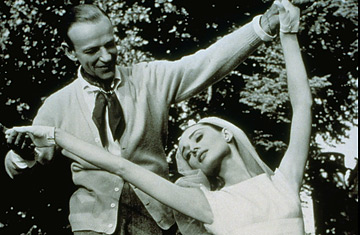
Funny Face starring Audrey Hepburn and Fred Astaire
Director: Stanley Donen; Writer: Leonard Gershe
With Audrey Hepburn, Fred Astaire, Kay Thompson, Michel Auclair
Paramount Home Video
Here's the "50th anniversary edition" of a strangely contradictory enterprise: stylish and snide, cosmopolitan and provincial. The movie was the second Paris-set 50s musical, after An American in Paris, to use old songs by George and Ira Gershwin — which is odd, since they didn't write Paris tunes. The Bonjour, Paris number (with Audrey singing, "I want to see the den of thinking men / Like Jean-Paul Sartre; / I must philosophize with all the guys / Around Montmartre") was by screenwriter Gershe and producer Roger Edens. Four of the six Gershwin numbers are from the 1927 Broadway Funny Face, which starred Fred and his sister Adele. So this is both a 50th anniversary for the movie and an 80th for the tunes.
Quality magazine editor Maggie Prescott (Thompson) sees herself as a style guide for "the great American woman who stands out there naked waiting for me to tell her what to wear." She commissions fashion photographer Dick Avery (Astaire) to find the It Girl of 1957, and he stumbles over her in the slim person of Greenwich Village intellectual Jo Stockton (Hepburn), a clerk in the Embryo Concepts book shop. What sounds like a pro-life emporium actually is a repository for volumes on modern philosophy, and Jo dreams of going to France to meet the Empathicalist guru Emile Flostre (Auclair). Jo's mission, Maggie's ambition and Dick's job brings them all to Paris for the story's sub-standard romantic exertions.
Funny Face concocted fictional versions of three famed postwar figures, treated with varying degrees of reverence, affection and derision: photographer Richard Avedon (who contributed to the movie's design), Harper's Bazaar editor Diana Vreeland and Existentialist author Jean-Paul Sartre. The Hepburn character spends most of the movie being bullied, betrayed and humiliated by this trio. They see her as a pretty thing easily molded to their designs. The film has a similarly odd view of Paris: a town of beautiful monuments and indolent, insolent people. A hotel desk clerk can't be roused to do his job; Left Bank denizens are shallow and sadomasochistic; and Flostre is revealed as a predatory fraud, ripe for being knocked out by Dick and bashed with a statue by Jo. She had naively believed Flostre wanted a serious discussion with her, but Avery says sneeringly, "He's about as interested in your intellect as I am." This from the movie's one love interest to the other.
Hollywood musicals loved to take rude swipes at outside, outsize intellects; the Astaire The Band Wagon of 1953 made labored fun of Orson Welles' grandiosity and capacious ego. So try to overlook Funny Face's ignorant envy of the French and concentrate on the film's gleeful plundering of Paris as a living archaeological dig. (Locations for Avery-Avedon's fashion shoots include the Louvre, the Opera House and a bateau mouche on the Seine.)
And revel in the glory of Audrey. Trained as a dancer, and game to sing the Gershwin tunes, she's a marvel in her first musical. In her early scenes, before she's glammed up in Givenchy frocks and Torquemada hairdos, Hepburn radiates her unique amalgam of character, spirit and intelligence. The movies have had a half-century to find an actress as heart-liftingly beautiful as Audrey, with anything like her. Couldn't be done. Can't be.